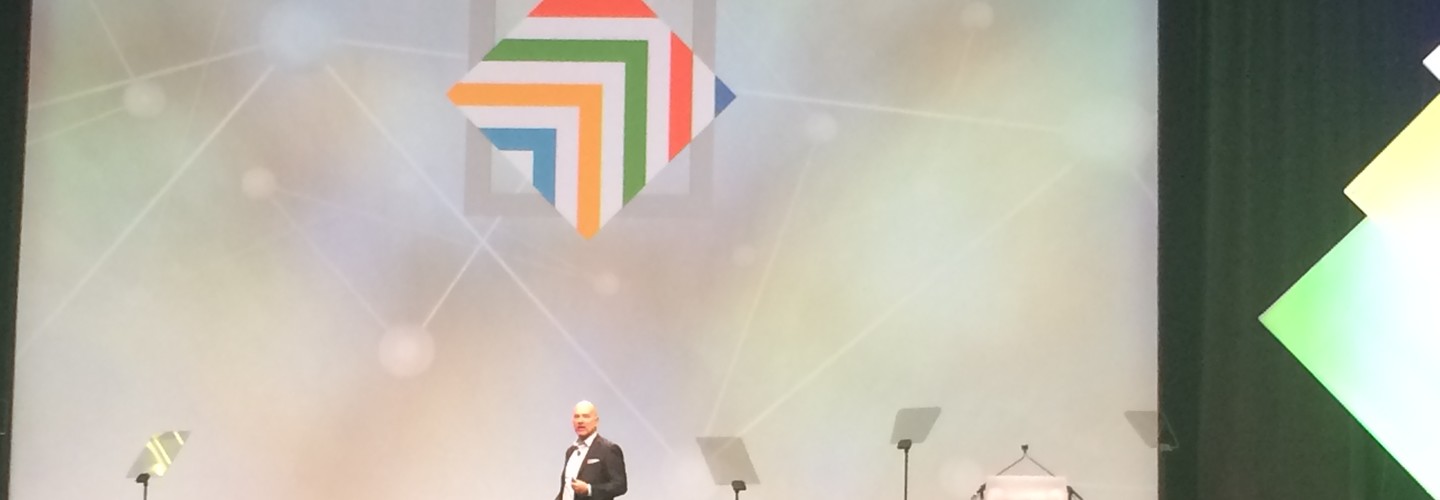EDUCAUSE 2015: Enter the Second Machine Age
Just 10 years ago, when The New Division of Labor: How Computers Are Creating the Next Job Market was published, driverless cars were called out as an impossible feat.
Andrew McAfee, principal research scientist at the Massachusetts Institute of Technology Sloan School of Management, told those gathered Thursday for his EDUCAUSE keynote that “one of the tasks this book noted that machines will continue to be lousy at — their prime example — was driving a car in traffic.”
“Because we’re such a social species, we’re very good at complex, very nuanced communication,” McAfee said. “The smart guess [in 2004] was that humans would be doing the work in our companies and our businesses that involves complex communication and pattern matching.”
But just six years after the book’s publication, Google announced that it had been at work on the driverless car concept for some time.
And as artificial intelligence evolves to perform tasks few imagined would be possible, our society has reached a point where we’re only beginning to see what’s possible through machine learning, McAfee said.
“Science fiction is becoming the reality, not just in the lab but in the real world. Not just once, but time after time. We need to get there and understand it,” he said as an introduction to his and co-author Erik Brynjolfsson’s latest book, The Second Machine Age: Work, Progress and Prosperity in a Time of Brilliant Technologies.
What’s New in the World of Machines?
“We’re seeing this crazy, unanticipated technological surge. We need to grapple with the consequences of that,” McAfee said. “Our old ways of thinking have been outstripped by events.”
This year marks the 50th anniversary of Gordon Moore’s prediction that computing power would double every year. McAfee said that we’ve watched computing power double about every 18 months, through the last 50 years.
“I think of this as the drumbeat behind the economy,” he said.
The sheer pace and size of that growth helps to explain so many of the innovations coming onto the market today, he said, “but we haven’t seen nothing yet. We’re going to see innovations that will improve our lives like nothing we’ve seen before.”
As scientists begin to teach computers to think and process information in new ways — learning in much the same ways a child’s brain learns through repetition and trial — they continue to push the boundaries of all that artificial intelligence can achieve.
He shared the findings from recent DeepMind work that created a computer capable of learning to play classic Atari games from scratch, as a child might, with no advance rules programming or instruction. In a matter of hours, the computer achieved so much progress that it now outperforms most humans.
‘I’m Not Anti-Human’
“In this era of really remarkable technological progress, how should we think about our minds and what we bring to the table?” McAfee asked those in attendance. “I’m not anti-human. I’m not anti-mind. We still have a lot to offer. We have amazing abilities that technology is not capable of replicating.”
But, he added, humans are “predictably irrational,” and, in business especially, tend to blindly trust or overestimate instinct and intuition.
“In the world of organizations, the geek has a mortal enemy, and that’s the hippo,” McAfee said, explaining that the “hippo” stands for “the highest paid person’s opinion.”
“That’s honestly how most organizations make most of their decisions most of the time,” he said. “What happens is, the team’s got to make a decision. We’ve got to head into the future somehow and, at some point, all eyes turn to the hippo.”
That judgment and intuition-based approach, as opposed to a more by-the-numbers approach, has prevented many businesses from moving forward. As new data and intelligence technologies come into play, business can instead advance on more evidence-based projections or decisions.
“We’re seeing more and more examples of competitions between these approaches,” he said. “And we’re a lot more receptive to machines and numbers.”
And as more evidence-based business practices move to the forefront, humans must look to enhance their social skills to remain competitive in the labor market, McAfee concluded.
EDUCAUSE will continue at the Indianapolis Convention Center through Friday. To keep up with the latest happenings at the conference, follow EdTech’s coverage here.








